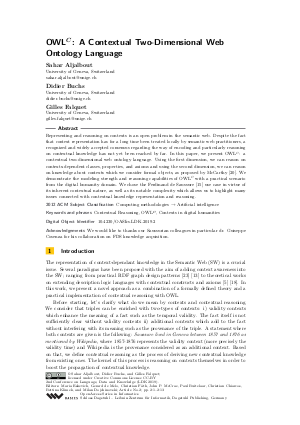OWL^C: A Contextual Two-Dimensional Web Ontology Language
Authors Sahar Aljalbout, Didier Buchs, Gilles Falquet
-
Part of:
Volume:
2nd Conference on Language, Data and Knowledge (LDK 2019)
Part of: Series: Open Access Series in Informatics (OASIcs)
Part of: Conference: Conference on Language, Data and Knowledge (LDK) - License:
 Creative Commons Attribution 3.0 Unported license
Creative Commons Attribution 3.0 Unported license
- Publication Date: 2019-05-16
File

PDF
OASIcs.LDK.2019.2.pdf
- Filesize: 477 kB
- 13 pages
Document Identifiers
Subject Classification
ACM Subject Classification
- Computing methodologies → Artificial intelligence
Keywords
- Contextual Reasoning
- OWL^C
- Contexts in digital humanities
Metrics
- Access Statistics
-
Total Accesses (updated on a weekly basis)
0Document
0Metadata
Abstract
Representing and reasoning on contexts is an open problem in the semantic web. Despite the fact that context representation has for a long time been treated locally by semantic web practitioners, a recognized and widely accepted consensus regarding the way of encoding and particularly reasoning on contextual knowledge has not yet been reached by far. In this paper, we present OWL^C : a contextual two-dimensional web ontology language. Using the first dimension, we can reason on contexts-dependent classes, properties, and axioms and using the second dimension, we can reason on knowledge about contexts which we consider formal objects, as proposed by McCarthy [McCarthy, 1987]. We demonstrate the modeling strength and reasoning capabilities of OWL^C with a practical scenario from the digital humanity domain. We chose the Ferdinand de Saussure [Joseph, 2012] use case in virtue of its inherent contextual nature, as well as its notable complexity which allows us to highlight many issues connected with contextual knowledge representation and reasoning.
Cite As Get BibTex
Sahar Aljalbout, Didier Buchs, and Gilles Falquet. OWL^C: A Contextual Two-Dimensional Web Ontology Language. In 2nd Conference on Language, Data and Knowledge (LDK 2019). Open Access Series in Informatics (OASIcs), Volume 70, pp. 2:1-2:13, Schloss Dagstuhl – Leibniz-Zentrum für Informatik (2019)
https://doi.org/10.4230/OASIcs.LDK.2019.2
BibTex
@InProceedings{aljalbout_et_al:OASIcs.LDK.2019.2,
author = {Aljalbout, Sahar and Buchs, Didier and Falquet, Gilles},
title = {{OWL^C: A Contextual Two-Dimensional Web Ontology Language}},
booktitle = {2nd Conference on Language, Data and Knowledge (LDK 2019)},
pages = {2:1--2:13},
series = {Open Access Series in Informatics (OASIcs)},
ISBN = {978-3-95977-105-4},
ISSN = {2190-6807},
year = {2019},
volume = {70},
editor = {Eskevich, Maria and de Melo, Gerard and F\"{a}th, Christian and McCrae, John P. and Buitelaar, Paul and Chiarcos, Christian and Klimek, Bettina and Dojchinovski, Milan},
publisher = {Schloss Dagstuhl -- Leibniz-Zentrum f{\"u}r Informatik},
address = {Dagstuhl, Germany},
URL = {https://drops.dagstuhl.de/entities/document/10.4230/OASIcs.LDK.2019.2},
URN = {urn:nbn:de:0030-drops-103666},
doi = {10.4230/OASIcs.LDK.2019.2},
annote = {Keywords: Contextual Reasoning, OWL^C, Contexts in digital humanities}
}
Author Details
Acknowledgements
We would like to thanks our Saussurian colleagues in particular dr. Guiseppe Cosenza for his collaboration on FDS knowledge acquisition.
References
-
Sahar Aljalbout, Didier Buchs, and Gilles Falquet. Introducing Contextual Reasoning to the Semantic Web with OWL^C. In Proceedings of the 24th International Conference on Conceptual Structures: ICCS. Springer, 2019.

- Sahar Aljalbout and Gilles Falquet. Un modèle pour la représentation des connaissances temporelles dans les documents historiques. In IC 2017 : 28es Journées francophones d'Ingénierie des Connaissances (Proceedings of the 28th French Knowledge Engineering Conference), Caen, France, July 3-7, 2017., pages 145-150, 2017. URL: https://hal.archives-ouvertes.fr/hal-01568018.
- Sahar Aljalbout and Gilles Falquet. A Semantic Model for Historical Manuscripts. arXiv preprint, 2018. URL: http://arxiv.org/abs/1802.00295.
-
Sahar Aljalbout, Gilles Falquet, and Didier Buchs. A Practical Implementation of Contextual Reasoning on the Semantic Web. In Proceedings of the 10th International Joint Conference on Knowledge Discovery, Knowledge Engineering and Knowledge Management - Volume 2: KEOD,, pages 255-262. INSTICC, SciTePress, 2018.

-
Djamal Benslimane, Ahmed Arara, Gilles Falquet, Zakaria Maamar, Philippe Thiran, and Faiez Gargouri. Contextual ontologies. Advances in Information Systems, pages 168-176, 2006.

-
Tim Berners-Lee, James Hendler, Ora Lassila, et al. The semantic web. Scientific american, 284(5):28-37, 2001.

-
Alexander Borgida and Luciano Serafini. Distributed description logics: Assimilating information from peer sources. J. Data Semantics, 1:153-184, 2003.

-
Paolo Bouquet, Fausto Giunchiglia, Frank Van Harmelen, Luciano Serafini, and Heiner Stuckenschmidt. C-owl: Contextualizing ontologies. In International Semantic Web Conference, pages 164-179. Springer, 2003.

-
Loris Bozzato, Martin Homola, and Luciano Serafini. Context on the semantic web: Why and how. ARCOE-12, page 11, 2012.

-
Giuseppe Cosenza. Tra terminologia e lessico: i percorsi di pensiero di F. de Saussure. PhD thesis, University of Calabria, 2015.

-
Renata Dividino, Sergej Sizov, Steffen Staab, and Bernhard Schueler. Querying for provenance, trust, uncertainty and other meta knowledge in RDF. Web Semantics: Science, Services and Agents on the World Wide Web, 7(3):204-219, 2009.

-
Chiara Ghidini and Fausto Giunchiglia. Local Models Semantics, or contextual reasoning=locality+compatibility. Artificial intelligence, 127(2):221-259, 2001.

-
José M Giménez-García, Antoine Zimmermann, and Pierre Maret. NdFluents: An Ontology for Annotated Statements with Inference Preservation. In European Semantic Web Conference, pages 638-654. Springer, 2017.

- Olaf Hartig and Bryan Thompson. Foundations of an alternative approach to reification in RDF. arXiv preprint, 2014. URL: http://arxiv.org/abs/1406.3399.
-
John E Joseph. Saussure. Oxford University Press, 2012.

-
Mathew Joseph and Luciano Serafini. Simple Reasoning for Contextualized RDF Knowledge. In WoMO, pages 79-93, 2011.

-
Szymon Klarman and Víctor Gutiérrez-Basulto. Two-Dimensional Description Logics for Context-Based Semantic Interoperability. In AAAI, 2011.

-
Oliver Kutz, Carsten Lutz, Frank Wolter, and Michael Zakharyaschev. E-connections of abstract description systems. Artificial intelligence, 156(1):1-73, 2004.

-
Joseph LaPorte. Rigid designators. Philosophical Studies, 130:321-–336, 2006.

-
John McCarthy. Generality in artificial intelligence. Communications of the ACM, 30(12):1030-1035, 1987.

-
Vinh Nguyen, Olivier Bodenreider, and Amit Sheth. Don't like RDF reification?: making statements about statements using singleton property. In Proceedings of the 23rd international conference on World wide web, pages 759-770. ACM, 2014.

-
Chris Welty. Context slices: representing contexts in OWL. In Proceedings of the 2nd International Conference on Ontology Patterns-Volume 671, pages 59-60. CEUR-WS. org, 2010.

-
Chris Welty, Richard Fikes, and Selene Makarios. A reusable ontology for fluents in OWL. In FOIS, volume 150, pages 226-236, 2006.

